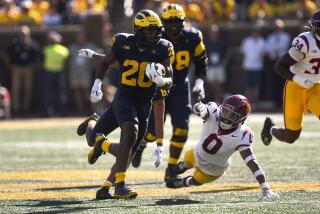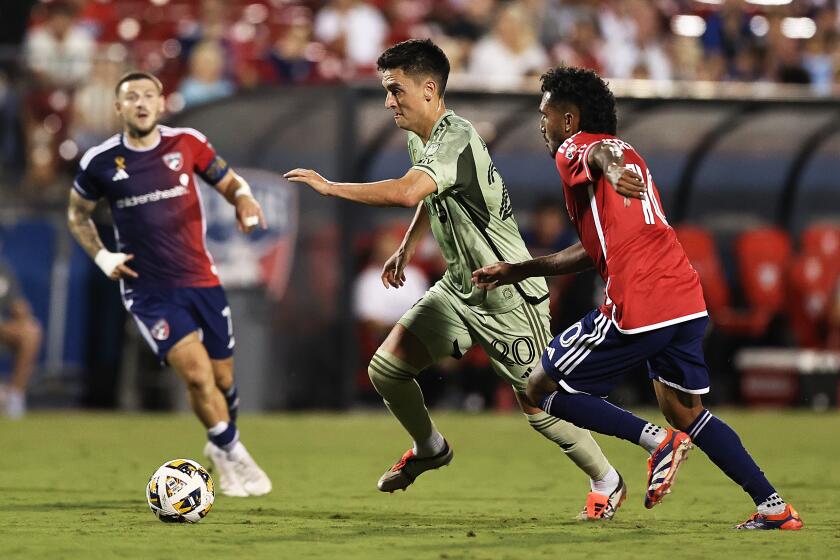Panel finds widespread worry about college athletic costs
The Knight Commission -- a blue-ribbon group that helped spark academic reform in college athletics -- has turned its attention to NCAA campuses where sports are big business.
Focusing on schools that play in the Football Bowl Subdivision, the commission discovered many college presidents are worried that athletic spending cannot continue at its current pace.
Specifically, some top administrators wonder how much longer they can afford to compete at the NCAA’s highest level and 85% believe football and basketball coaches receive excessive compensation.
The report comes at a time when the troubled economy is forcing schools in California and across the nation to trim faculty and class offerings.
“I do think the fiscal circumstances that our nation and our states find themselves in will provide momentum for change,” said William E. “Brit” Kirwan, the Knight Commission’s co-chairman and chancellor of the University System of Maryland. “The difficult times that our universities are experiencing aren’t going to go away in the short run.”
On Monday, the commission released the first step in a yearlong effort, a survey of presidents from 95 of the 120 FBS schools.
The annual athletic budgets on those campuses range from about $14 million to more than $80 million. The survey found that subsidies provided to athletic departments have risen more quickly than educational budgets.
The money is going not only to coaches but to new stadiums and weight rooms and operating costs associated with ever-growing seasons fueled, in part, by television dollars.
“We need to get to the point where the expenditures on intercollegiate athletics are in proportion to the expenditures in the rest of the university,” said co-chairman R. Gerald Turner, president of Southern Methodist University.
Turner’s fellow presidents worry about a gap between smaller schools and those who receive millions from football’s Bowl Championship Series contract.
On a smaller scale, a similar divide is widening between athletics and the educational mission at many schools, the survey suggests.
The Knight Commission was created in 1989 as an independent watchdog for college sports. Though it has no jurisdiction over the NCAA, its earliest campaigns paved the way for the Academic Progress Rate that now penalizes teams whose athletes do not perform satisfactorily in the classroom.
Academic reform took years to coalesce, and commission members warned that economic changes could be equally difficult.
In the survey, presidents suggested trimming coaching staffs and shortening seasons in various sports. Some administrators wondered whether the NCAA would alter a policy that requires schools to maintain at least 16 men’s and women’s teams to qualify for Division I membership.
Cutting coaching salaries could be trickier.
The NCAA lost in court when it tried to restrict salaries for some assistants.
Presidents do not see anti-trust status as a viable option, nor do they seem willing to unilaterally lower salaries, worried about putting their teams at a competitive disadvantage against rivals continuing to spend more.
In Southern California, USC football Coach Pete Carroll earns $4.4 million a year. Across town, UCLA basketball Coach Ben Howland received more than $2.17 million in salary and incentives last year.
“I understand it and I can see why they may be concerned,” Carroll said at USC’s practice Monday. “Times are tough.”
If economic reform is to succeed, it will need to gain traction among athletic directors, which already seems to be the case, said Dutch Baughman, executive director of the Division IA Athletic Directors Assn.
But it is doubtful any meaningful proposals will come before next spring, when the Knight Commission issues a full report based on its findings.
“This isn’t going to happen in the short run,” Turner said. “We can get started, but it’s going to take some hard work and persistence.”
--
twitter.com/LATimesWharton
Times staff writer Gary Klein contributed to this report.
More to Read
Go beyond the scoreboard
Get the latest on L.A.'s teams in the daily Sports Report newsletter.
You may occasionally receive promotional content from the Los Angeles Times.











